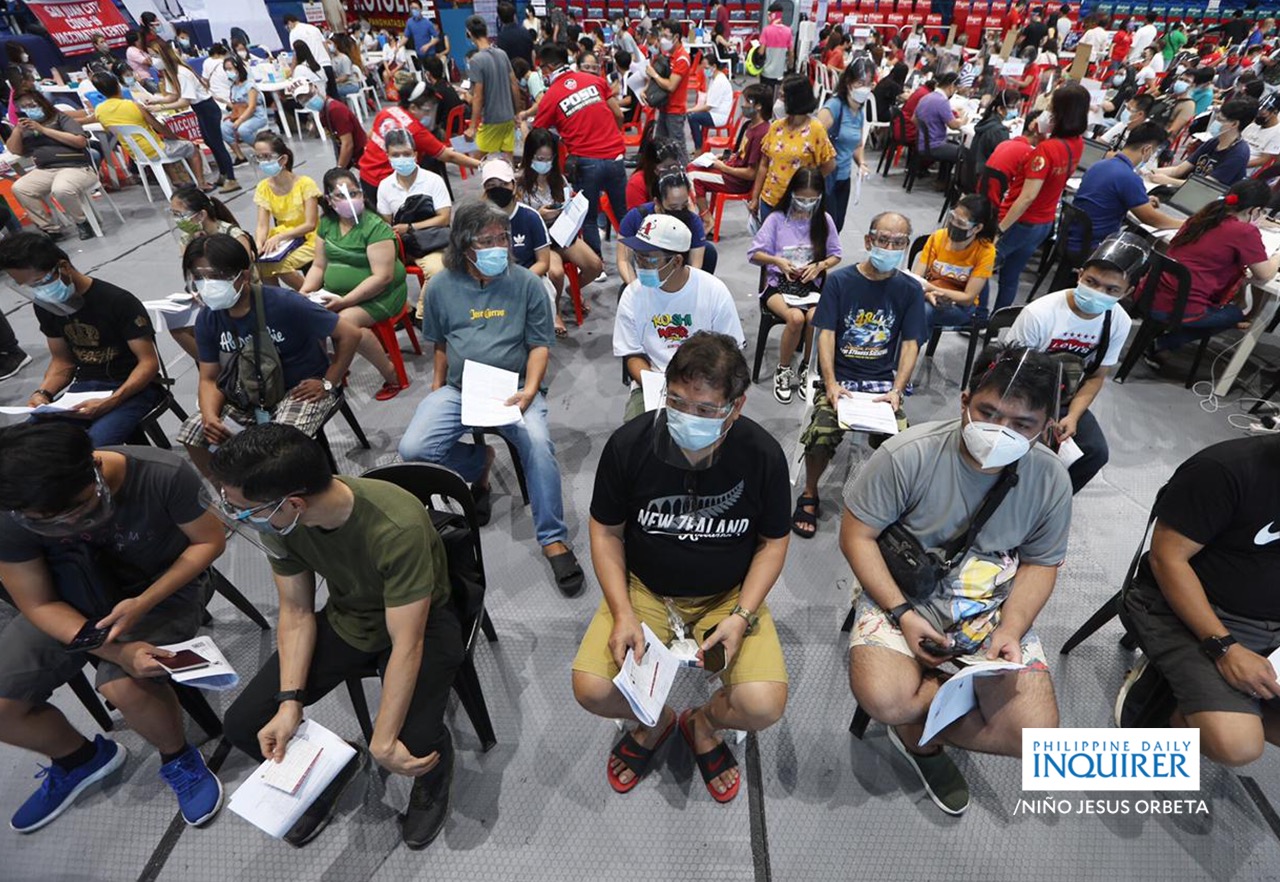Vax allocation triggers dispute between Garin, Galvez

Mayor Francis Zamora leads the launch of Moderna vaccines for residents under the A1, A2, A3, A4 and A5 categories in San Juan City’s vaccination program at the FilOil Flying V Centre, on June 30. Niño Jesus Orbeta/Philippine Daily Inquirer
A dispute over the allocation of scarce COVID-19 vaccines to the provinces broke out in the open on Thursday with a lawmaker denying that she wanted her own supply of doses for her constituents and the official in charge of vaccinations warning politicians against using the inoculation program for their electoral advantage.
Secretary Carlito Galvez Jr., chief implementer of the National Task Force (NTF) Against COVID-19, on Thursday said there was no “palakasan,” or preferential treatment through political connections, in the distribution of vaccines, an allegation made last week by Iloilo Rep. Janette Garin, a former health secretary.
In a television interview, Galvez said vaccines were allocated to the regions based on the number of COVID-19 cases, population density and economic activities.
He explained that vaccines are coursed through either the local government or the community health development offices.
“What former Secretary Garin wanted was we give her the doses, which is not right. She asked for allocation, but this would result in some confusion among LGUs (local government units) because she’s not in the lineage of distribution,” Galvez said.
‘A big lie’
He acknowledged Garin’s help in ramping up testing for the coronavirus but added that there were “many politicians in Region 6” (Western Visayas), which includes Iloilo province, who wanted to implement vaccinations themselves.
But Garin said she never wanted to get the vaccines for herself.
“That is not true. That is a big lie,” Garin told reporters during an online press briefing. “What I am asking for is equitable and fair distribution of vaccines.”
She rejected Galvez’s accusation of politicking, saying that she was only bringing the concerns of her constituents to the attention of the government.
“I was very surprised that the common response to us is ‘wait for your turn, you don’t have a surge,’” she said. According to her, the government should come up with a systematic distribution because there was no clear scientific basis for allocating vaccines to various local government units.
While she admired Galvez for his work as the so-called vaccine czar, Garin said “science is different.”
She suggested that there should be “proportionate distribution based on population.”
“We cannot just learn the ropes while we are already in the middle of a fight. We need our infectious disease specialists, our vaccinologists, and our epidemiologist to come into the picture, and that is how it should be,” she said.
“How can you plan if you don’t even know what weapons you will be given? How can you plan if you don’t even know how the government will augment your pandemic response? So basically, that is my concern,” she added.
She wasn’t the first lawmaker to complain about the vaccine distribution.
Deputy Speaker and Cagayan de Oro City Rep. Rufus Rodriguez had castigated Galvez and Health Secretary Francisco Duque III for the low supply of COVID-19 vaccines in Mindanao.
Galvez later apologized and sent vaccines to areas in Mindanao experiencing a surge in COVID-19 cases.
Jabs being ‘used in politics’
In the television interview, Galvez said he was now seeing “how vaccines are being used in politics” ahead of next year’s elections.
“That’s what we discourage. Please do not use the vaccines as political weapons,” he said.
He also called out groups and individuals who displayed political tarpaulins at vaccination sites, as this may be construed as electioneering.
One such instance was in Legazpi City, Albay province, where local politicians and a party list were involved.
In a statement, the NTF asked the local government department to investigate, but it did not specify the locality.
Danilo Arao, convener of the poll watchdog Kontra Daya, said it was “clearly a case of premature campaigning.”
He denounced politicians attempting “to hijack government activities like vaccination[s] for their own electoral agenda.”3 percent vaccinated
In the same television interview, Galvez said 12.6 million doses had been administered since the vaccination program was rolled out in March, with 3 percent of the population now fully protected after receiving two doses.
The country could expect more vaccines in the third quarter of this year, he said.
Galvez said the country revised its “population protection” target this year after the World Health Organization set a lower goal due to the emergence of more transmissible variants.
“Realistically speaking, 70 million first dose, we can achieve that before November,” he said.
The government initially aimed to fully inoculate 70 percent of its adult population by year-end.